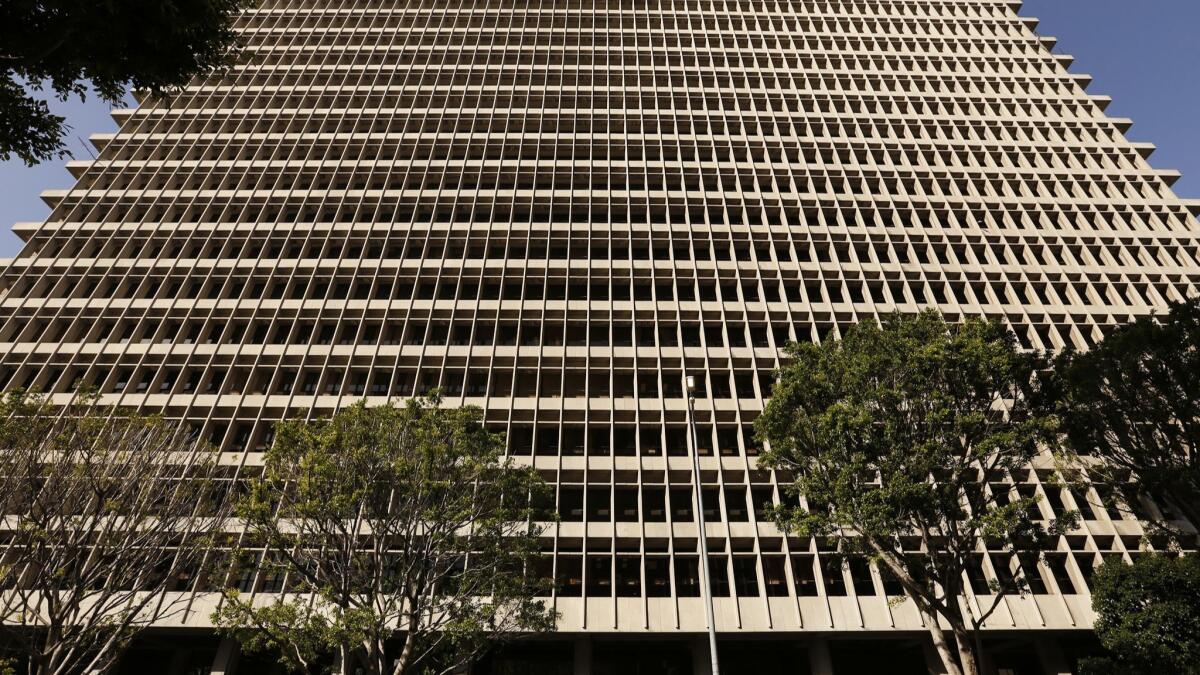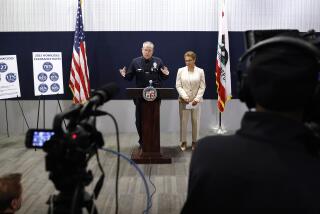LAPD, other authorities arranged courthouse recording that prompted confidentiality concerns, court document shows

A courthouse recording that raised concerns about violations of attorney-client confidentiality was made by the Los Angeles Police Department at the request of a deputy district attorney and with the cooperation of the Sheriff’s Department, according to a court document filed Monday.
Craig Kleffman, the prosecutor previously assigned to a case involving three people charged with kidnapping and assault, enlisted the support of LAPD officers and a sheriff’s sergeant to place recording devices in a courthouse lockup, according to a declaration by Stephen Gunson, the prosecutor currently assigned to the case. The devices were ultimately placed in a courthouse interview room where attorneys meet with their clients.
For the record:
12:10 p.m. July 31, 2018An earlier version of this article incorrectly referred to the three people charged in the case that is the subject of the recording allegations as plaintiffs. They are criminal defendants.
No employee of the district attorney’s office has listened to the recordings, Gunson said.
Interim Public Defender Nicole Davis Tinkham sent a confidential email to the county Board of Supervisors this month, informing the officials that her office was investigating the recording operation.
The deputy public defender who alleged that her conversations with a client had been recorded, Tiffiny Blacknell, asked the district attorney’s office to hand over information related to the details of the operation.
Last week the LAPD submitted to the court two DVDs of the recordings, which will be held under seal.
On Monday, Gunson detailed some aspects of the recording operation, including names of those involved but did not specify whether it had captured attorney-client communications. A spokeswoman for the district attorney’s office previously said attorney-client calls had “inadvertently” been recorded.
Between 5 and 6 a.m. on July 3, according to Gunson’s declaration, a member of the LAPD placed two hidden recording devices “on the inmates’ side” of the 14th-floor interview room at the Clara Shortridge Foltz Criminal Justice Center.
“The 14th-floor inmate interview room was apparently selected because it was the only custodial setting in which male inmates, such as Keith Stewart and Johntae Jones, and female inmates, such as Amber Neal, could be in close proximity to one another such that they could engage in clear conversation,” the filing said, referring to the defendants.
Kleffman had proposed the idea to LAPD investigators on the case and received approval from a sergeant with the Sheriff’s Department but did not obtain a court order or warrant.
The three defendants, set to be arraigned later that day, were brought into the interview room about 6 a.m. and remained there until about 10:30 a.m., the declaration said. During that time no “live agents” engaged in conversation with the defendants to elicit incriminating statements.
“It was not the intent … to record any portion of conversations between inmates and their attorneys,” the declaration said.
The devices were removed between 11 a.m. and noon.
The filing asked the court to appoint a special master to review the recordings to determine whether they contained privileged attorney-client communications. It said the district attorney’s office “does not object to the destruction of those portions.”
Gunson asked for additional time to gather and organize emails and text messages that could be related to the operation, noting their “voluminous nature.” The judge gave him until Aug. 9.
The LAPD said in a statement Monday, “As a result of a kidnap investigation LAPD Detectives placed recording devices in a holding cell of the court with the intention of recording a specific inmate to inmate conversation. The action was legal and was supported by the District Attorney’s office.”
The Sheriff’s Department issued an apology to the public defender’s office on July 20, saying that the recording had been “inadvertent” and that the department was taking “immediate steps” to ensure it would not happen again, though it did not provide specifics.
“Please be assured that the Sheriff’s Department will never intentionally conduct a recording operation that could capture privileged communications between your lawyers and their clients absent a court order,” said the letter, which was signed by Maria Gutierrez, chief of the court services division.
In an interview Monday, Blacknell said, “I do not take at face value that the intent was not to record attorney-client communications. It’s too suspicious given the surrounding circumstances.”
She said authorities could have chosen a different location to record the inmates, stopped the recording before attorneys entered the interview room or confirmed it once she raised her suspicions with the court.
A spokeswoman for the district attorney’s office said the matter has been referred to its Justice System Integrity Division for review.
Twitter: @AgrawalNina
UPDATES:
4:20 p.m. Aug. 1: This article was updated to clarify that prosecutor Craig Kleffman requested that the recording devices be placed in a courthouse lockup. They were ultimately placed in a courthouse interview room where lawyers talk to clients.
This article was originally published on July 30 at 7:25 p.m.
More to Read
Start your day right
Sign up for Essential California for news, features and recommendations from the L.A. Times and beyond in your inbox six days a week.
You may occasionally receive promotional content from the Los Angeles Times.







